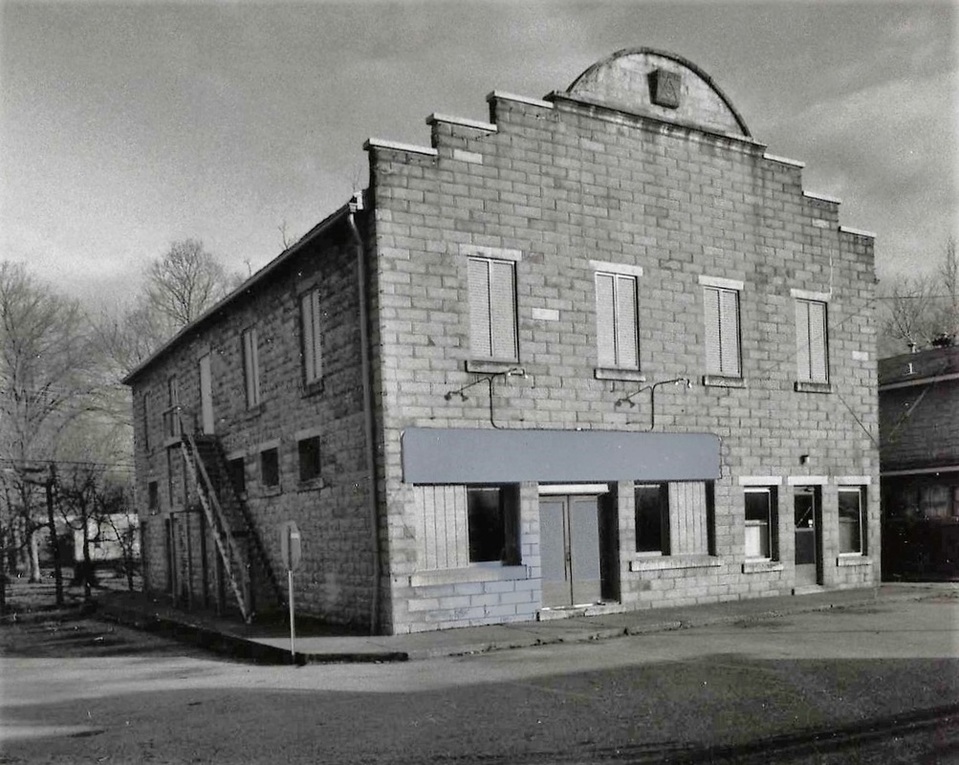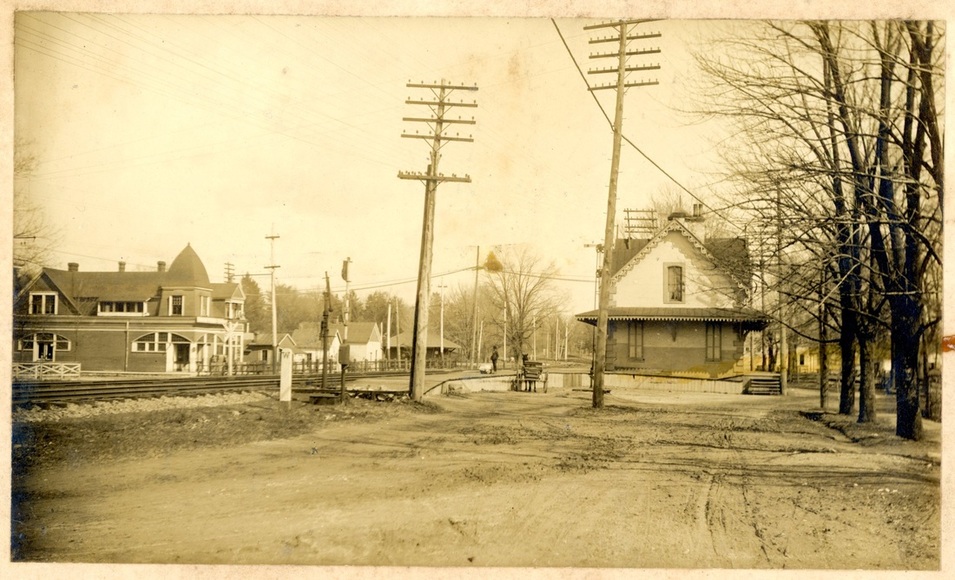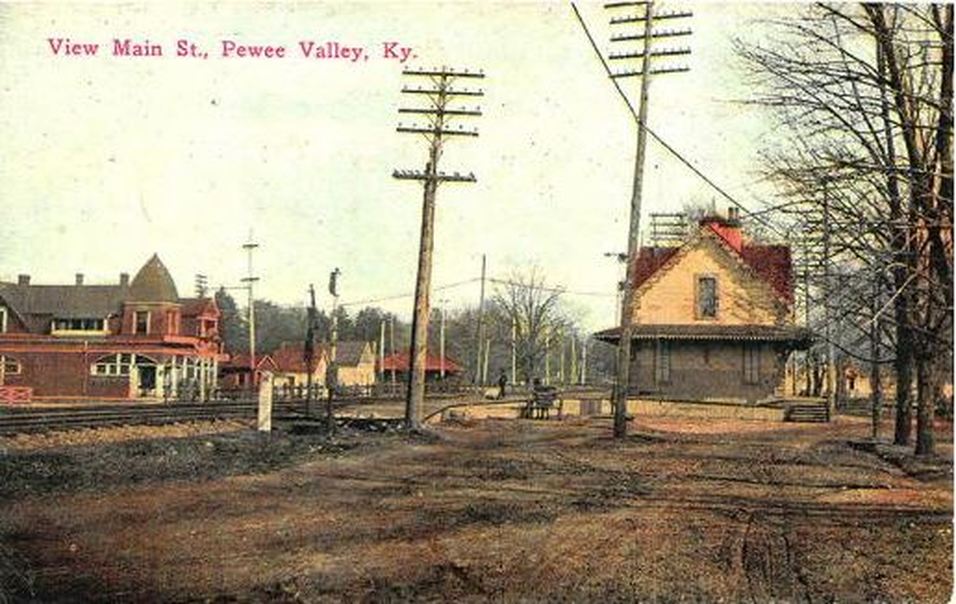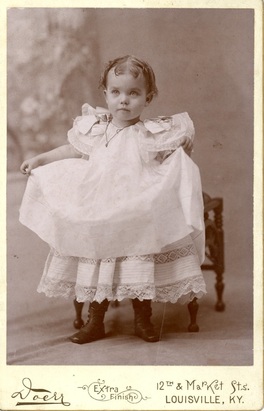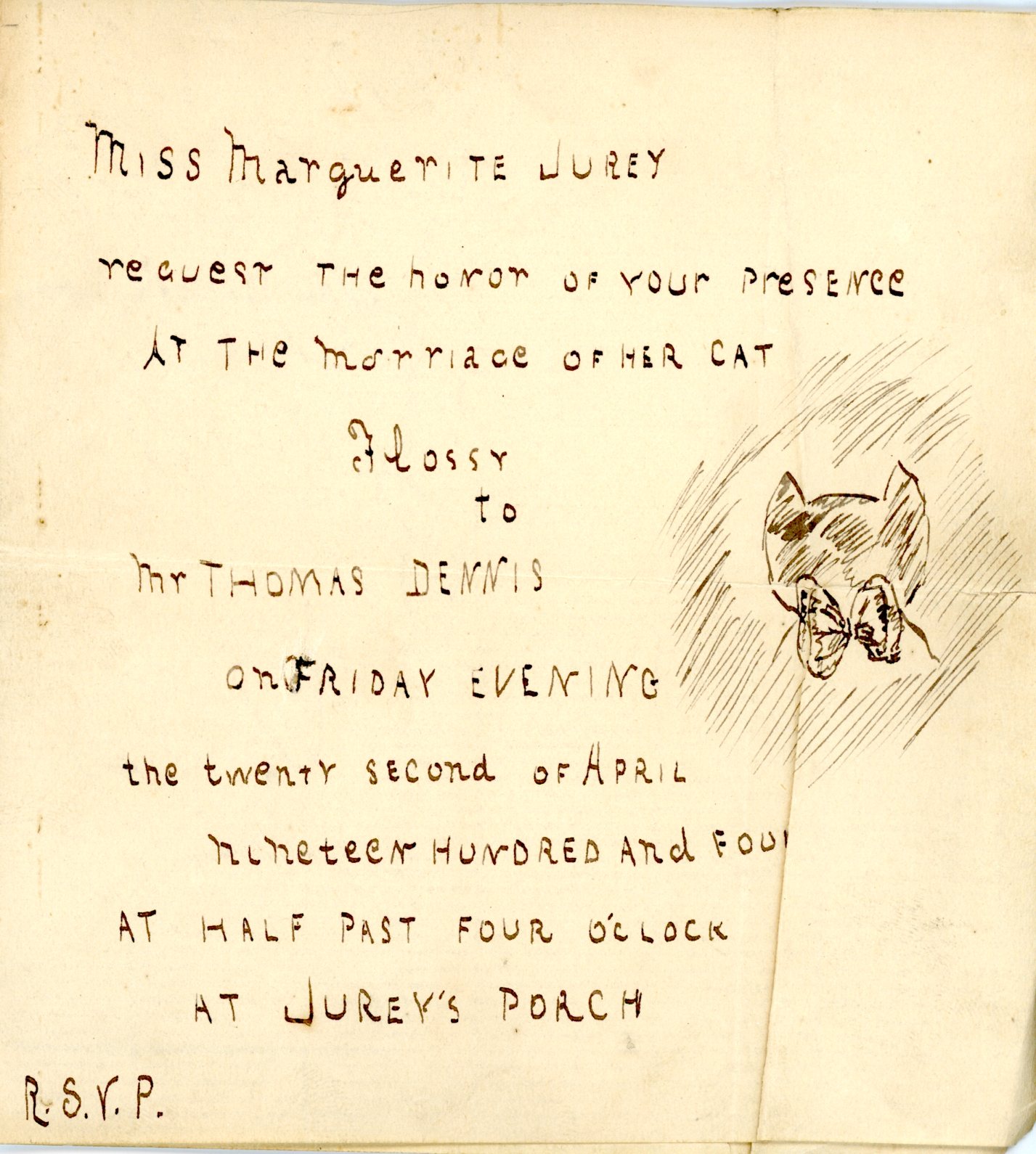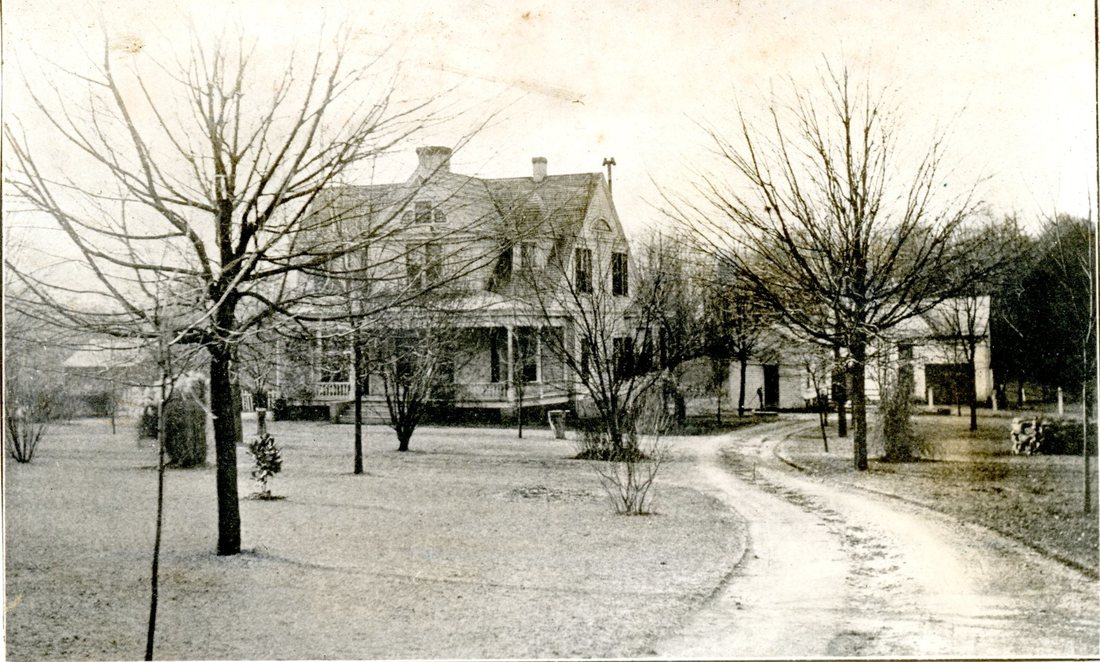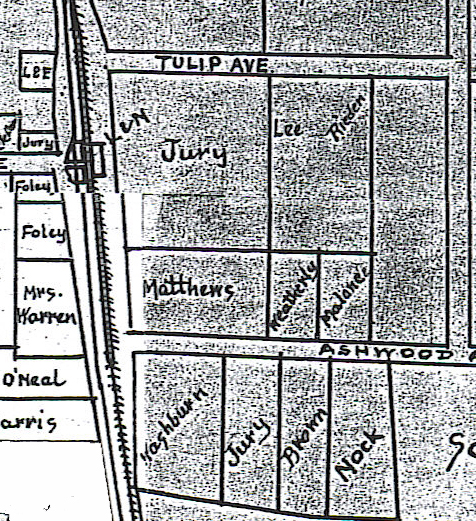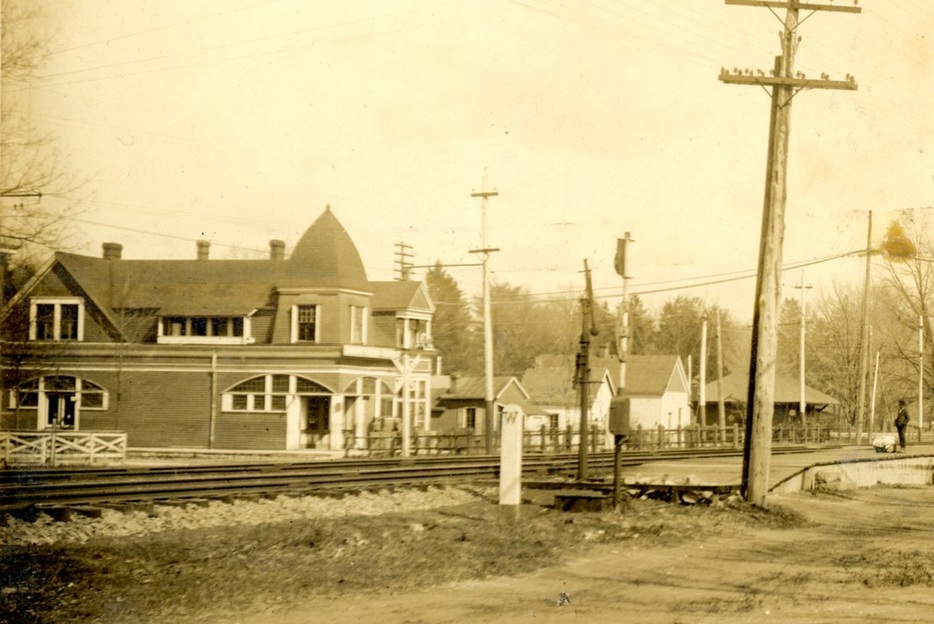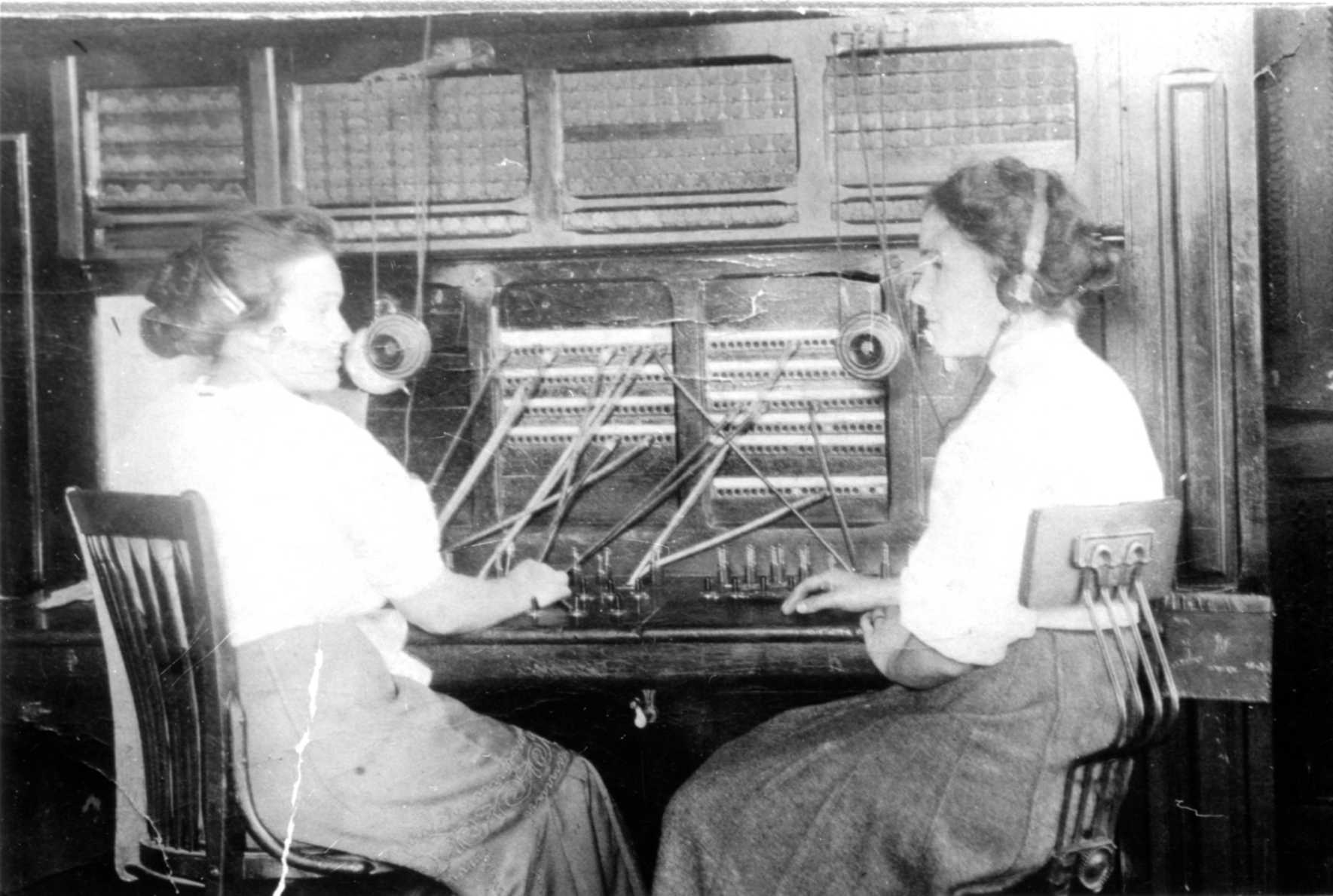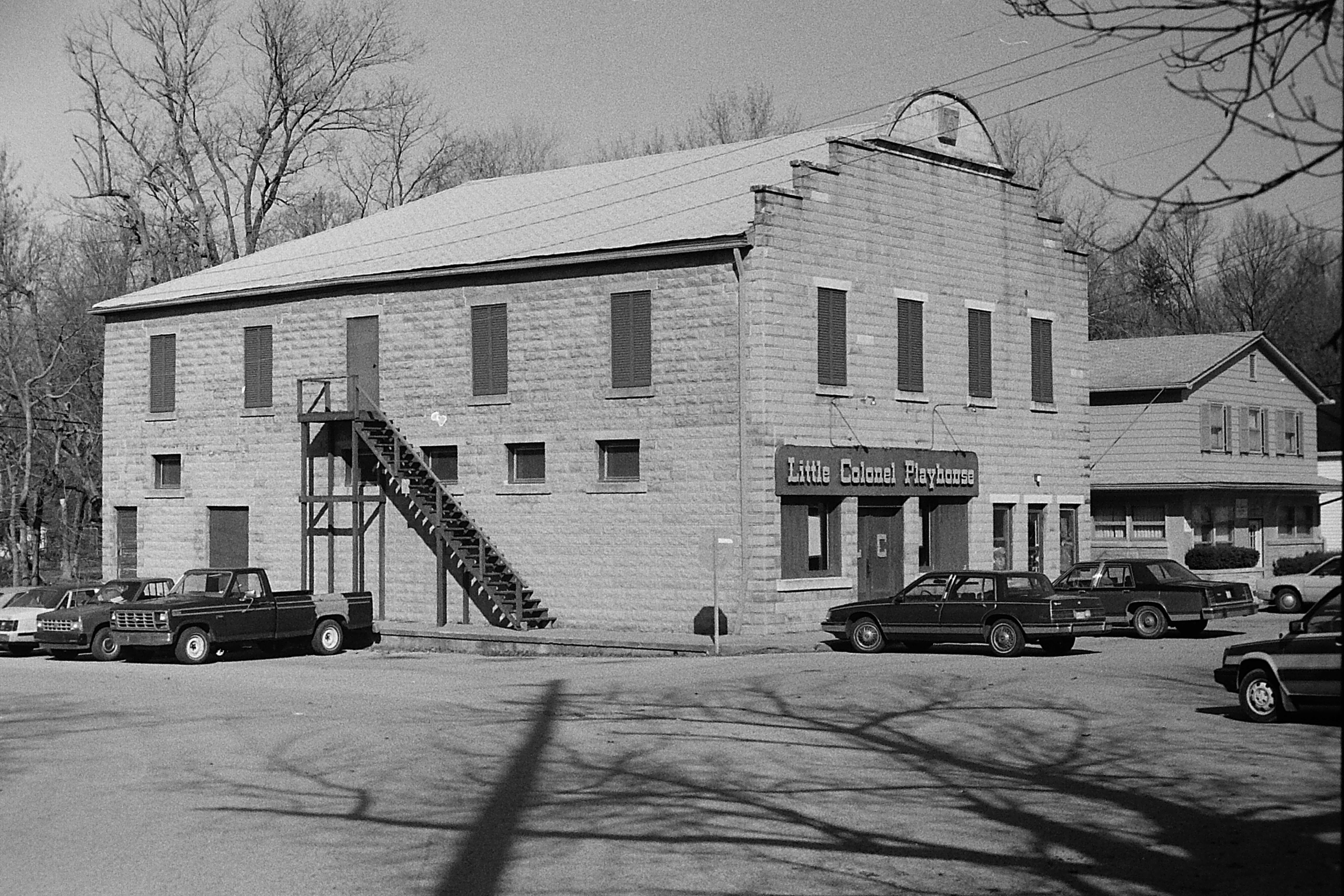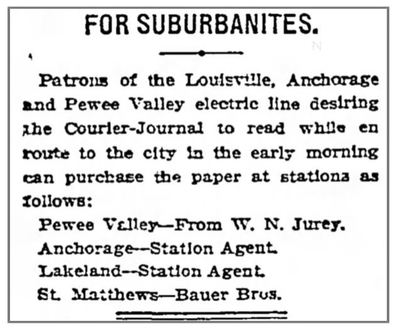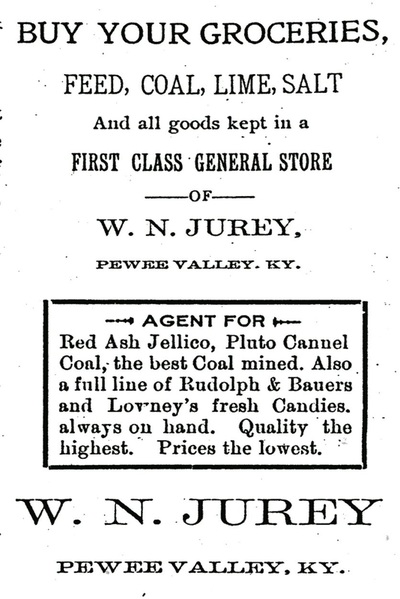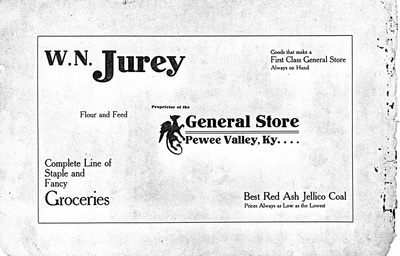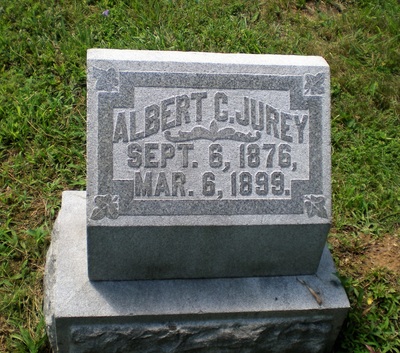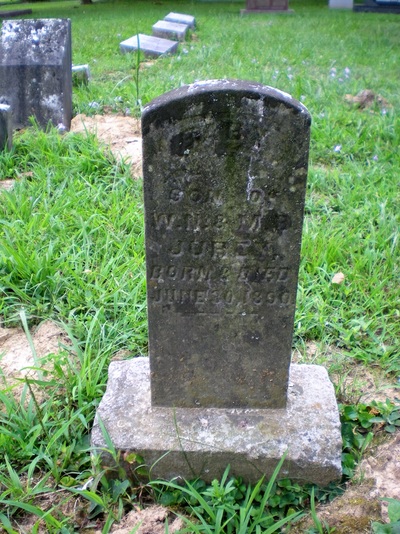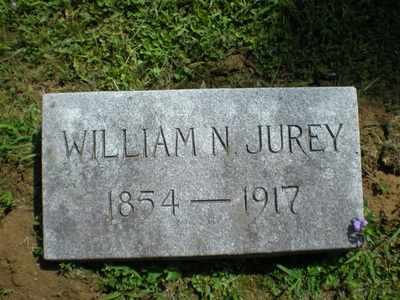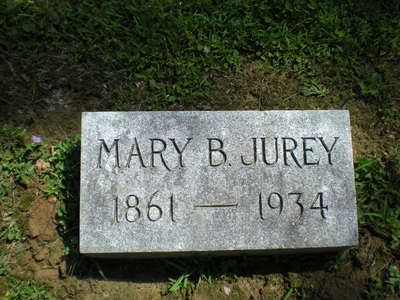The Little Colonel Playhouse: The W.N. Jurey Years
Built in 1912 by railroad depot agent and shopkeeper William Nice Jurey, the Little Colonel Playhouse housed three grocery stores, the Pewee Valley Masonic Lodge and the Pewee Valley Post Office at various times before the Little Colonel Players took over in 1963.
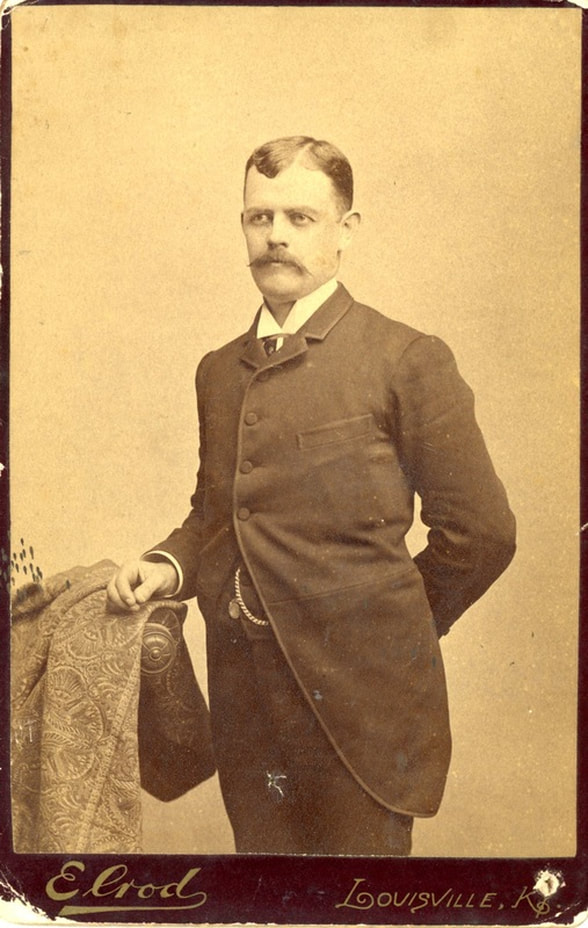 William N. Jurey. Courtesy of Donna Russell
William N. Jurey. Courtesy of Donna Russell
W.N. Jurey arrived in Pewee Valley in 1890 from Paynes Depot, Kentucky, near Midway, where he'd been working as a depot agent and postmaster. He had served as Paynes Depot postmaster since June 15, 1877. The April 17, 1889 Courier-Journal carried a brief story about him in their Bourbon Gossip column, titled "A Postmaster Whom Everyone Likes." The story noted:
A petition has been forwarded to the Postmaster General at Washington by the citizens of Payne's Depot, this county, asking that no change be made in the post-office at that place, as W.N. Jurey has held the office for eighteen years and given entire satisfaction to all. The petition was signed by every white citizen -- Republican and Democrat -- who receives mail at that office, with a single exception -- the man that did not sign it being an applicant for the office.
He evidently lost the political battle to retain the postmaster position. According to June Brandt, Research Analyst, Postal History, Jurey was replaced by the Willeses -- Clay Willis on April 26, 1889, who was succeeded by Emma (his sister or wife?) on December 29, 1890.
The loss of the postmaster position may have prompted Jurey's decision to leave Paynes Depot. In 1890, he moved to Pewee Valley along with his second wife, Mary B. Wilson or "Mamie," whom he had married in 1889, and three children from his first marriage:
A petition has been forwarded to the Postmaster General at Washington by the citizens of Payne's Depot, this county, asking that no change be made in the post-office at that place, as W.N. Jurey has held the office for eighteen years and given entire satisfaction to all. The petition was signed by every white citizen -- Republican and Democrat -- who receives mail at that office, with a single exception -- the man that did not sign it being an applicant for the office.
He evidently lost the political battle to retain the postmaster position. According to June Brandt, Research Analyst, Postal History, Jurey was replaced by the Willeses -- Clay Willis on April 26, 1889, who was succeeded by Emma (his sister or wife?) on December 29, 1890.
The loss of the postmaster position may have prompted Jurey's decision to leave Paynes Depot. In 1890, he moved to Pewee Valley along with his second wife, Mary B. Wilson or "Mamie," whom he had married in 1889, and three children from his first marriage:
- Albert (September 26, 1876-March 6, 1899);
- Minnie (February 10, 1879-December 22, 1931); and
- Corey (November 30, 1882-December 1968). His first wife may have died in childbirth after giving birth to Corey, who was named for her.
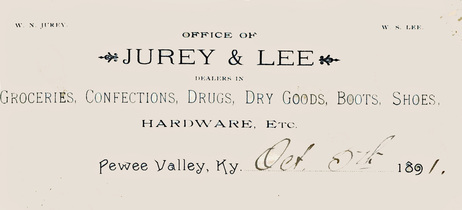 From "Pewee Valley: Land of the Little Colonel" by Katie S. Smith, published in 1974.
From "Pewee Valley: Land of the Little Colonel" by Katie S. Smith, published in 1974.
By 1891, he had partnered with William Silas Lee, a Peweean who had previously been working as a painter (he painted Town Hall when it was built), and opened a general store that carried groceries, confections, drugs, dry goods, boot and shoes.
Within two years, the partnership with Lee had broken up. Jurey was in business for himself and had expanded his inventory to include coal.
On May 1, 1893, he was appointed Postmaster of Pewee Valley. Presumably the post office operated from his store until he lost the appointment in 1897 -- again the result of politics, when Joseph Calvert used his political pull to get his son Charles and daughter Mary the position.
Within two years, the partnership with Lee had broken up. Jurey was in business for himself and had expanded his inventory to include coal.
On May 1, 1893, he was appointed Postmaster of Pewee Valley. Presumably the post office operated from his store until he lost the appointment in 1897 -- again the result of politics, when Joseph Calvert used his political pull to get his son Charles and daughter Mary the position.
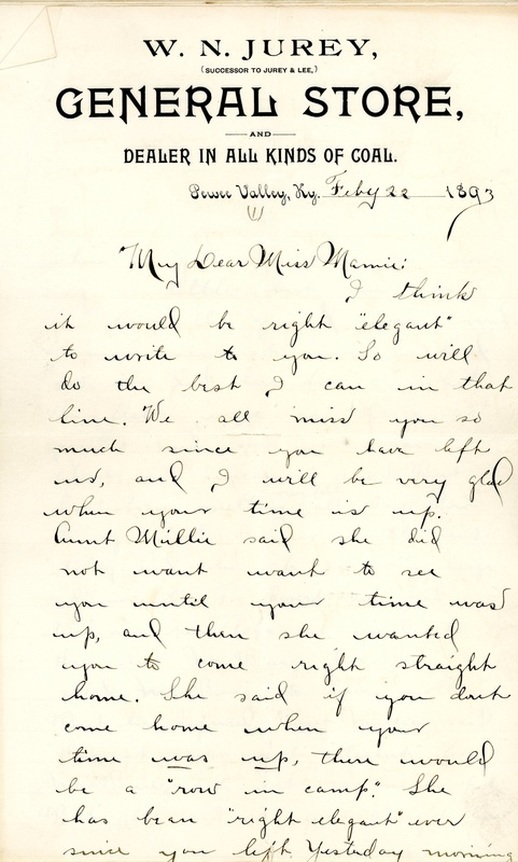 Courtesy Donna Russell
Courtesy Donna Russell
The letter below, written by Jurey's son Albert to his stepmother Mamie (who appears to have been pregnant at the time with Marguerite) offers a glimpse of daily life in the Jurey household in 1893:
I think it would be right "elegant" to write to you. So will do the best I can in that line. We all miss you so much since you have left us, and I will be very glad when your time is up. Aunt Millie (editor's note: Aunt Millie appears to have been the African-American servant caring for the children in Mary Jurey's absence) said she did not want to see you until your time was up, and then she wanted you to come right straight home. She said if you don't come home when your time was up, there would be a "row in the camp." She has been right elegant since you left yesterday morning. When I got up, it was snowing a little, but in about an hour the ground was covered. I never saw it snow as hard as it did here for a while, the flakes were as large as quarters. And even now we have about six inches of snow. But has been melting very fast all day. Mr. Burge took dinner with us today. And he ate a very large dinner too. For dessert we had turn over pies. Papa as usual ate three. And Mr. Burge two. Papa asked Mr. Burge to have another. But he refused. Aunt Millie said it was not "elegant" for Mr. Burge to eat so much pie. But she said it was alright for the "boss" to eat all he wanted. I had a holiday today (George Washington's birthday), but the girls did not.
I think it would be right "elegant" to write to you. So will do the best I can in that line. We all miss you so much since you have left us, and I will be very glad when your time is up. Aunt Millie (editor's note: Aunt Millie appears to have been the African-American servant caring for the children in Mary Jurey's absence) said she did not want to see you until your time was up, and then she wanted you to come right straight home. She said if you don't come home when your time was up, there would be a "row in the camp." She has been right elegant since you left yesterday morning. When I got up, it was snowing a little, but in about an hour the ground was covered. I never saw it snow as hard as it did here for a while, the flakes were as large as quarters. And even now we have about six inches of snow. But has been melting very fast all day. Mr. Burge took dinner with us today. And he ate a very large dinner too. For dessert we had turn over pies. Papa as usual ate three. And Mr. Burge two. Papa asked Mr. Burge to have another. But he refused. Aunt Millie said it was not "elegant" for Mr. Burge to eat so much pie. But she said it was alright for the "boss" to eat all he wanted. I had a holiday today (George Washington's birthday), but the girls did not.
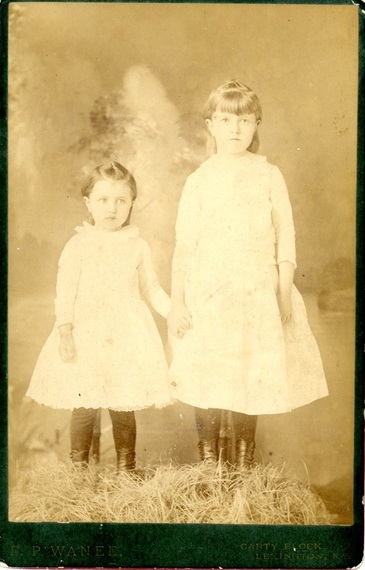 Corey and Minnie Jurey in February 1893. This is the photo mentioned in the letter from Albert Jurey to his stepmother Mary. Courtesy Donna Russell.
Corey and Minnie Jurey in February 1893. This is the photo mentioned in the letter from Albert Jurey to his stepmother Mary. Courtesy Donna Russell.
Pop misses you so much, he goes over to the depot and stays for about five minutes and then comes over to the store and stays about the same length of time, and then he will go back to the depot. And he keeps this up nearly all day. He does not eat as much now as he did when you were here. Pop said you had an alligator egg for me. I am so glad. I would very much like to see it. How large is it. And he said you had some kind of a reptile (I can not think the name just now) for me. Aunt Millie said if you bring home any vermin she is going to leave.
Weissingers big tobaco (sic) factory burned yesterday about 3 P.M. o'clock. (Editor's note: the Harry Weissinger Tobacco Company was owned by Harry Weissinger, son-in-law of Judge Peter B. Muir, and was located in Louisville.) We, the whole family, came to town last Saturday. Minnie and Corrie had their countenances taken. But as yet we have not recd. their proofs. We went to the theatre. And Corrie came near pounding me to death in one exciting act. She chases me with the poker nearly every time I go up stairs. Ah! but she is a terror. From all appearance this evening, Corrie has the mumps. Aunt Millie said, "look a hear chile if you got the 'munks', this here coon is going to leave." But she talks a great deal "through her hat." Well as I am about run down here, will close for this time. Write soon. I am and ever your boy.
Albert
Weissingers big tobaco (sic) factory burned yesterday about 3 P.M. o'clock. (Editor's note: the Harry Weissinger Tobacco Company was owned by Harry Weissinger, son-in-law of Judge Peter B. Muir, and was located in Louisville.) We, the whole family, came to town last Saturday. Minnie and Corrie had their countenances taken. But as yet we have not recd. their proofs. We went to the theatre. And Corrie came near pounding me to death in one exciting act. She chases me with the poker nearly every time I go up stairs. Ah! but she is a terror. From all appearance this evening, Corrie has the mumps. Aunt Millie said, "look a hear chile if you got the 'munks', this here coon is going to leave." But she talks a great deal "through her hat." Well as I am about run down here, will close for this time. Write soon. I am and ever your boy.
Albert
Albert Jurey's Elopement
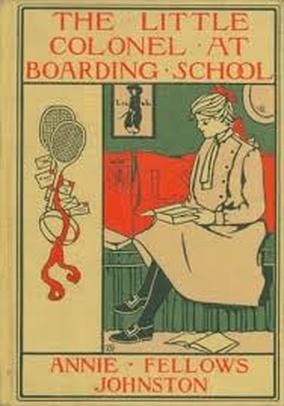
Four years later in 1897, Albert caused quite a scandal when he eloped with a 17-year-old student at the Kentucky College for Young Ladies. The story was picked up by a number of papers across Kentucky, and even appeared in Milford, Iowa's Milford Mail on February 11:
KENTUCKY ELOPEMENT.
________________
Principal of a Female Seminary
Drives the Lover Away With a
Pistol.
Frankfort, Ky., Feb. 6--At Pewee Valley last night Miss Mary Potter, one of the pupils of the Kentucky Female seminary, and Albert Jurey attempted to elope. They were intercepted at the door of the academy by Prof. Berry, principal of the school, who, with a pistol in hand, compelled the groom to be and several of his friends to leave without the young lady. Miss Potter, who belongs to a wealthy and aristocratic family of Bowling Green, was sent home in charge of a female teacher. Jurey followed and hopes to gain her parents' consent to their marriage.
By the evening of Friday, February 5, however, it was too late to stop the wedding. The couple had already tied the knot in Jeffersonville, Indiana, earlier that day, after purchasing a marriage license on January 29.
The Jurey-Potter elopement may have inspired Ida Shane's elopement in Annie Fellows Johnston's novel "The Little Colonel at Boarding School," which was published later that year.
Sadly, Albert Jurey died just a few years after his wedding. He passed away on March 6, 1899 of meningitis at home in Pewee Valley. At the time, the 22-year-old was serving as a lieutenant in the Forester Guards. He left behind his young wife and a child.
W.N. Jurey's First Store
 From "Pewee Valley: Land of the Little Colonel" published by Katie S. Smith in 1974
From "Pewee Valley: Land of the Little Colonel" published by Katie S. Smith in 1974
While William Jurey had kept a store in Pewee Valley since 1891, he evidently rented space for his business the first few years. At some point before 1897, he purchased several lots fronting Railroad Avenue, including the lot on which Town Hall was built, which he rented and later sold to the city, and the lot to the east beside it, which he sold to the interurban for their depot and turnaround in 1902. He also owned the lot at the corner of Central and Railroad Avenue, which is where he built his first store. It was a two-story frame in the Queen Anne style, with living space on the second floor and the store below. The Jureys were living above it when the census was taken in 1900. Letterhead used later in the store's history states that the business was established in 1889, which may reflect the year the building was completed.
Minnie and Corey Get Married
In October 1903, William Jurey's daughter Corey got engaged to Sherman Weatherly, who worked for the L&N Railroad. They married in December of that year and eventually built a home on Ash Avenue. His oldest daughter, Minnie, who was Corey's matron of honor, had married Nathaniel Harvey Ingles around 1902 and was living in Middlesboro, Ky. No newspaper notice of the wedding has been found.
|
Corey's baby sister, Marguerite, appears to have been inspired by her older sister's nuptials. The seven-year-old held a wedding for her cat Flossy on her parents' front porch on April 22, 1904 and sent out formal invitations, complete with a reply card.
|
The Jurey Homes
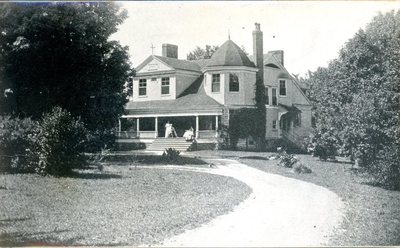 Jurey home in 1897. The house is still extant and listed on the National Register of Historic Places as the Truman-Nock House. Source: "Beautiful Pewee Valley," published in 1909 by Powhatan Wooldridge and George Washburn. Photo reproduction from "Pewee Valley: Land of the Little Colonel" published by Katie S. Smith in 1974.
Jurey home in 1897. The house is still extant and listed on the National Register of Historic Places as the Truman-Nock House. Source: "Beautiful Pewee Valley," published in 1909 by Powhatan Wooldridge and George Washburn. Photo reproduction from "Pewee Valley: Land of the Little Colonel" published by Katie S. Smith in 1974.
At some point between 1900 and 1910, the Jureys purchased a house at what is now 110 Ashwood Avenue. That house, which burned in the 1940s, was included in "Beautiful Pewee Valley," published by George Washburne and Powatan Wooldridge in 1909 and identified as the W.N. Jurey home. The property is the site of the Logsdan House today.
There is also evidence they owned or rented a home on Ashwood Avenue some years earlier. The April 4, 1897 Courier-Journal carried a feature titled, "Some Pretty Homes of Pewee Valley" that included a pen and ink sketch of their residence. That house is known today as the Truman-Nock House.
The 1907 map of Pewee Valley shows that W.N. Jurey owned a significant amount of property. In addition to the lot at 110 Ashwood Lane and the corner lot on Railroad Avenue for the store, he also owned the land later purchased by the Herdts for the Herdt Motor Company and a new family home, after they lost their house on Rollington Road to a fire.
There is also evidence they owned or rented a home on Ashwood Avenue some years earlier. The April 4, 1897 Courier-Journal carried a feature titled, "Some Pretty Homes of Pewee Valley" that included a pen and ink sketch of their residence. That house is known today as the Truman-Nock House.
The 1907 map of Pewee Valley shows that W.N. Jurey owned a significant amount of property. In addition to the lot at 110 Ashwood Lane and the corner lot on Railroad Avenue for the store, he also owned the land later purchased by the Herdts for the Herdt Motor Company and a new family home, after they lost their house on Rollington Road to a fire.
The 1912 Fire That Threatened to Destroy Pewee Valley
It was late afternoon on the Fourth of July, 1912, when a fire broke out on the ground floor of Jurey's store. The blaze took almost two days to extinguish and threatened downtown Pewee Valley with total devastation. The unlikely heroine of the story: Cumberland Telephone Company operator Ida Ochsner, who was the only person in the building at the time. The July 4, 1912 Courier-Journal reported:
RISKS LIFE TO
GIVE WARNING
__________
'Phone Girl Escapes Flames
By Climbing Down Pole
__________
First Sounds Alarm and Sends
Call for Aid
__________
Blaze in Pewee Valley Does
$10,000 Damage
__________
OLD SOLDIERS FIGHT FIRE
Sticking to her post until all exits were closed by flames, Miss Ida Ochsner, of Lyndon, telephone operator at Pewee Valley, yesterday afternoon at 4:30 o'clock probably saved the larger part of the town from burning. The building, in which the telephone exchange is located, was destroyed at a loss of more than $10,000.
The fire originated in the first floor, which was occupied by William Jurey as a general store. When discovered the whole of the interior was ablaze.
Miss Ochsner was the first to discover the blaze. She at once set to work, telephoning the two hundred users of the telephones and stayed at her post until she had given the alarm to all who could be reached.
*****
Finds Stairway Cut Off
_____
When the young woman had finished her self-appointed task, she started for the stairway leading to safety, only to find it closed by a sheet of flames. She then ran to a window and, as the citizens ran to her aid, succeeded in climbing down a telephone pole.
The first firemen to arrive on the scene were the members of the Confederate Home department. This is a body of old soldiers residing at the State home, and they did effective work in their efforts to save business houses from the flames.
The Anchorage department arrived a few minutes later after the veterans and between them they prevented more than a few hundred dollars damage being done the remaining business houses. The store of Moley Brothers, next door, suffered about $500 damage before the fire was extinguished. Most of this was due to water.
*****
Only Person In Building.
_____
The building was a two-story frame and was occupied by the general store and the Cumberland Telephone and Telegraph Company's exchange. The only person in the building at the time was the operator.
The flames were made doubly hard to fight by the fact that Mr. Jurey had a large stock of shotgun and pistol shells. The explosions of those shells gave the fire the appearance of a Fourth of July celebration and the fire fighters for time feared to enter the building because of them.
*****
Breaks Out Anew
_____
At 9:40 o'clock last night engine No. 1 of the Louisville department went to the scene on a special train, upon receipt of news that the fire had broken out anew in a coal bunker, and it was feared that the Standard Oil tanks were in danger. The call for aid was communicated to Chief Lehan at 8 o'clock.
That the Cumberland exchange will be in operation again by Monday was the declaration of Manager Webb. A new switchboard will be ordered this morning, and it should be ready for installation by Sunday night or Monday, he said. The telephones will be placed in readiness, so that they can be connected within a few hours.
*****
No One In Store
_____
How the fire started is not known. No one had been in the Jurey store since early morning, and there had been no fire in the place in the last few weeks, it was declared.
Following the fire, it was announced that the citizens will organize a volunteer department and purchase apparatus immediately. The only means at hand to fight yesterday's blaze, until the arrival of the outside departments, was a bucket brigade, and the narrow escape impressed the need, so that a movement was started at once.
RISKS LIFE TO
GIVE WARNING
__________
'Phone Girl Escapes Flames
By Climbing Down Pole
__________
First Sounds Alarm and Sends
Call for Aid
__________
Blaze in Pewee Valley Does
$10,000 Damage
__________
OLD SOLDIERS FIGHT FIRE
Sticking to her post until all exits were closed by flames, Miss Ida Ochsner, of Lyndon, telephone operator at Pewee Valley, yesterday afternoon at 4:30 o'clock probably saved the larger part of the town from burning. The building, in which the telephone exchange is located, was destroyed at a loss of more than $10,000.
The fire originated in the first floor, which was occupied by William Jurey as a general store. When discovered the whole of the interior was ablaze.
Miss Ochsner was the first to discover the blaze. She at once set to work, telephoning the two hundred users of the telephones and stayed at her post until she had given the alarm to all who could be reached.
*****
Finds Stairway Cut Off
_____
When the young woman had finished her self-appointed task, she started for the stairway leading to safety, only to find it closed by a sheet of flames. She then ran to a window and, as the citizens ran to her aid, succeeded in climbing down a telephone pole.
The first firemen to arrive on the scene were the members of the Confederate Home department. This is a body of old soldiers residing at the State home, and they did effective work in their efforts to save business houses from the flames.
The Anchorage department arrived a few minutes later after the veterans and between them they prevented more than a few hundred dollars damage being done the remaining business houses. The store of Moley Brothers, next door, suffered about $500 damage before the fire was extinguished. Most of this was due to water.
*****
Only Person In Building.
_____
The building was a two-story frame and was occupied by the general store and the Cumberland Telephone and Telegraph Company's exchange. The only person in the building at the time was the operator.
The flames were made doubly hard to fight by the fact that Mr. Jurey had a large stock of shotgun and pistol shells. The explosions of those shells gave the fire the appearance of a Fourth of July celebration and the fire fighters for time feared to enter the building because of them.
*****
Breaks Out Anew
_____
At 9:40 o'clock last night engine No. 1 of the Louisville department went to the scene on a special train, upon receipt of news that the fire had broken out anew in a coal bunker, and it was feared that the Standard Oil tanks were in danger. The call for aid was communicated to Chief Lehan at 8 o'clock.
That the Cumberland exchange will be in operation again by Monday was the declaration of Manager Webb. A new switchboard will be ordered this morning, and it should be ready for installation by Sunday night or Monday, he said. The telephones will be placed in readiness, so that they can be connected within a few hours.
*****
No One In Store
_____
How the fire started is not known. No one had been in the Jurey store since early morning, and there had been no fire in the place in the last few weeks, it was declared.
Following the fire, it was announced that the citizens will organize a volunteer department and purchase apparatus immediately. The only means at hand to fight yesterday's blaze, until the arrival of the outside departments, was a bucket brigade, and the narrow escape impressed the need, so that a movement was started at once.
Peweeans continued to battle the flames into the next day. The July 6 Courier-Journal reported:
Tired and worn, many of them hungry, citizens of Pewee Valley, and members of the fire department of LaGrange, last night, extinguished the blaze which had threatened the destruction of the town since last Thursday afternoon. Almost thirty hours elapsed from the discovery of the blaze until it was extinguished. Although the fire was thought to have been out at one time, a blaze in a coal bunker near the large tanks of the Standard Oil Company, caused terror among the citizens yesterday and until 10 o'clock last night, when the last hose was uncoupled and the fire fighters left for their homes.
The fire in the coal bunker was discovered about 9:40 o'clock Thursday night. An appeal for aid was sent to Fire Chief Lehan, of the Louisville, department, and he ordered Engine No. 2 to the scene. The volunteer department from Anchorage already had done valiant service. When the Louisville firemen arrived there they were unable to unload their engine from the flat car on which the journey was made and they returned to this city.
The citizens of the town made the best of the facilities and kept the fire from spreading to any great extent during the night. The closeness of the tanks caused alarm. The tanks contained about 10,000 gallons of oil. There was a constant leakage from them which could not be stopped and it was feared this would become ignited.
*****
Blaze Breaks Out Anew
_____
Late yesterday afternoon the blaze in the coal pile broke out anew, at a spot nearest the oil tanks. The alarm was sounded and in short time a large volunteer brigade was working against the flames. An urgent appeal brought the Lagrange department, an engine and reel, to the scene in cars of the Louisville & Eastern railway. Despite the increased fighting force, the blaze gained headway and the fears of the populace were heightened when the tanks were scorched. Streams of water were directed against them. The citizens, whose homes and properties were at stake, finally triumphed and at 10 o'clock last night the last red spark disappeared.
The sole remaining line of the Cumberland Telephone Company between Pewee Valley and Louisville went out last night. The service beyond the town was not interfered with, as the calls were relayed over another circuit. The officials of the company declared that the new quarters on the second floor of the Louisville & Nashville Railroad Company's depot would be ready for service by Sunday. A new operating board will be installed.
W.N. Jurey, whose general store, on the first floor of the building occupied by the telephone company, was gutted by flames, yesterday secured quarters on the first floor of the L&N depot. Mr Jurey announced yesterday that he would begin at once the erection of a concrete and stone building. Jurey said he carried insurance on about 75 percent of the destroyed stock.
Tired and worn, many of them hungry, citizens of Pewee Valley, and members of the fire department of LaGrange, last night, extinguished the blaze which had threatened the destruction of the town since last Thursday afternoon. Almost thirty hours elapsed from the discovery of the blaze until it was extinguished. Although the fire was thought to have been out at one time, a blaze in a coal bunker near the large tanks of the Standard Oil Company, caused terror among the citizens yesterday and until 10 o'clock last night, when the last hose was uncoupled and the fire fighters left for their homes.
The fire in the coal bunker was discovered about 9:40 o'clock Thursday night. An appeal for aid was sent to Fire Chief Lehan, of the Louisville, department, and he ordered Engine No. 2 to the scene. The volunteer department from Anchorage already had done valiant service. When the Louisville firemen arrived there they were unable to unload their engine from the flat car on which the journey was made and they returned to this city.
The citizens of the town made the best of the facilities and kept the fire from spreading to any great extent during the night. The closeness of the tanks caused alarm. The tanks contained about 10,000 gallons of oil. There was a constant leakage from them which could not be stopped and it was feared this would become ignited.
*****
Blaze Breaks Out Anew
_____
Late yesterday afternoon the blaze in the coal pile broke out anew, at a spot nearest the oil tanks. The alarm was sounded and in short time a large volunteer brigade was working against the flames. An urgent appeal brought the Lagrange department, an engine and reel, to the scene in cars of the Louisville & Eastern railway. Despite the increased fighting force, the blaze gained headway and the fears of the populace were heightened when the tanks were scorched. Streams of water were directed against them. The citizens, whose homes and properties were at stake, finally triumphed and at 10 o'clock last night the last red spark disappeared.
The sole remaining line of the Cumberland Telephone Company between Pewee Valley and Louisville went out last night. The service beyond the town was not interfered with, as the calls were relayed over another circuit. The officials of the company declared that the new quarters on the second floor of the Louisville & Nashville Railroad Company's depot would be ready for service by Sunday. A new operating board will be installed.
W.N. Jurey, whose general store, on the first floor of the building occupied by the telephone company, was gutted by flames, yesterday secured quarters on the first floor of the L&N depot. Mr Jurey announced yesterday that he would begin at once the erection of a concrete and stone building. Jurey said he carried insurance on about 75 percent of the destroyed stock.
The July 11, 1912 Jeffersonian reprinted a story from the Louisville Times, which provided some additional details about the fire:
- The total estimated loss from the fire, including the destruction of the telephone exchange, Jurey's store and damage to nearby structures, was estimated at $20,000.
- Jury's store, the feed store, the coal bin and the stable were destroyed. Moley Bros. store on Jury's east side sustained $500 damage. Also damaged was the barber shop between Moley Bros. and Town Hall.
- Foley Bros. store across Central Avenue also ignited, but the flames were extinguished before much damage was done.
- Damage to the Cumberland Telephone exchange was estimated at $4,000. The company quickly rigged up a direct line to Louisville so the town wasn't left without service.
The Fire's Aftermath: A New Fireproof Store and a Wedding for Miss Ochsner
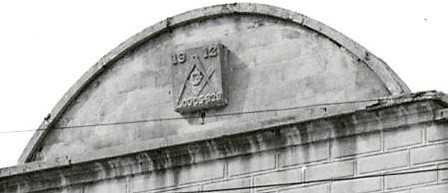 The Masonic Lodge Symbol at the top of Jury's concrete stone store. Photo ca. late 1950s from "Pewee Valley: Land of the Little Colonel" published in 1974 by Katie S. Smith
The Masonic Lodge Symbol at the top of Jury's concrete stone store. Photo ca. late 1950s from "Pewee Valley: Land of the Little Colonel" published in 1974 by Katie S. Smith
Jurey made good on his vow to rebuild his store. The material he used was fireproof concrete stone, and he built a second floor specifically for the Pewee Valley Masonic Lodge. This is the building the Little Colonel Playhouse now calls home. The citizens of Pewee Valley, however, didn't honor their vow to start a fire department for another 17 years. The town suffered several more spectacular fires, including the 1920 conflagration at the Kentucky Confederate Home, before the Pewee Valley Fire Department was officially founded in 1929.
And what became of town heroine and chief telephone operator Ida Ochsner? The Cumberland Telephone Company reported:
To the many stories of heroism attributed to telephone operators in general, we take pleasure in adding one connected to the fire in Pewee Valley, in which the building housing our switchboard was destroyed. Miss Ida Ochsner, Chief Operator, distinguished herself by devotion to duty by remaining at the switchboard until she had notified the local officers of the Company and spread the alarm throughout the neighborhood and called for help, which she did at great personal risk, for when she attempted to make her exit from the burning building she found the hall and stairway in flames. Closing the door she sprang through the open window to the cable pole near the building and descended by the pole steps to the street. Her presence of mind and brave conduct excited considerable newspaper comment and as a sequel we are told she received a telegraphic marriage proposal from far away Texas, but it is needless to say that a young lady of her spirit and so many excellent qualities does not need to consider such remote proposals. Furthermore, a little news bearing bird of the Valley has told us she has plenty of better admirers nearer home, and one in particular, who will doubtless see to it that a jewel of such value is not to be borne so far away.
"The better admirer nearer home" was William Herdt, Sr., who was working at the family business Herdt Motor Company across the tracks from Jurey's store. William, Sr.'s and Ida Ochsner Herdt's son William, Jr., later talked about his mother's popularity after the fire in the December 14, 2000 Oldham Era:
"She got about four marriage proposals in a four-state area," Herdt said.
To the many stories of heroism attributed to telephone operators in general, we take pleasure in adding one connected to the fire in Pewee Valley, in which the building housing our switchboard was destroyed. Miss Ida Ochsner, Chief Operator, distinguished herself by devotion to duty by remaining at the switchboard until she had notified the local officers of the Company and spread the alarm throughout the neighborhood and called for help, which she did at great personal risk, for when she attempted to make her exit from the burning building she found the hall and stairway in flames. Closing the door she sprang through the open window to the cable pole near the building and descended by the pole steps to the street. Her presence of mind and brave conduct excited considerable newspaper comment and as a sequel we are told she received a telegraphic marriage proposal from far away Texas, but it is needless to say that a young lady of her spirit and so many excellent qualities does not need to consider such remote proposals. Furthermore, a little news bearing bird of the Valley has told us she has plenty of better admirers nearer home, and one in particular, who will doubtless see to it that a jewel of such value is not to be borne so far away.
"The better admirer nearer home" was William Herdt, Sr., who was working at the family business Herdt Motor Company across the tracks from Jurey's store. William, Sr.'s and Ida Ochsner Herdt's son William, Jr., later talked about his mother's popularity after the fire in the December 14, 2000 Oldham Era:
"She got about four marriage proposals in a four-state area," Herdt said.
Advertisements for Jurey's Store
Marguerite Gets Married
After her brother Albert's death in 1899 and the marriages of her older sisters Minnie and Corey, Marguerite Jurey (August 29, 1893-March 29, 1977) was essentially an only child. And her parents appeared to dote on her, judging by some of the entertainments they gave her. In 1904, for her 11th birthday, they rented an interurban car for a "trolley party" to a park in St. Matthews. In March 1905, they allowed her to give a dance at their house. A veritable "who's who" of children from Pewee's well-to-do families attended, as the March 19, 1905 Courier-Journal reported:
... Among those present were Misses Elvira Johnston, Hattie Cochran, Katie Malone, Corinne Kaye, Anna Louise Washburne, Frances Lawton, Louise Lawton, Genevieve Ross, Catherine Lawton, Maria Crittenden, Marguerite Jurey, Mary Forrester, Mildred Telford; Mesrs. Charles Mason Blackley, Norman Blackley, Charlie Ross, Will Newman, John Newman, Charlie Newman, Douglas Kirk, Lewis Micou (editor's note: a cousin) and Mr. and Mrs. W.N. Jurey. (Editor's note: the Newmans owned Bemersyde before it was purchased and significantly enlarged by Rev. Peyton Hoge)
... Among those present were Misses Elvira Johnston, Hattie Cochran, Katie Malone, Corinne Kaye, Anna Louise Washburne, Frances Lawton, Louise Lawton, Genevieve Ross, Catherine Lawton, Maria Crittenden, Marguerite Jurey, Mary Forrester, Mildred Telford; Mesrs. Charles Mason Blackley, Norman Blackley, Charlie Ross, Will Newman, John Newman, Charlie Newman, Douglas Kirk, Lewis Micou (editor's note: a cousin) and Mr. and Mrs. W.N. Jurey. (Editor's note: the Newmans owned Bemersyde before it was purchased and significantly enlarged by Rev. Peyton Hoge)
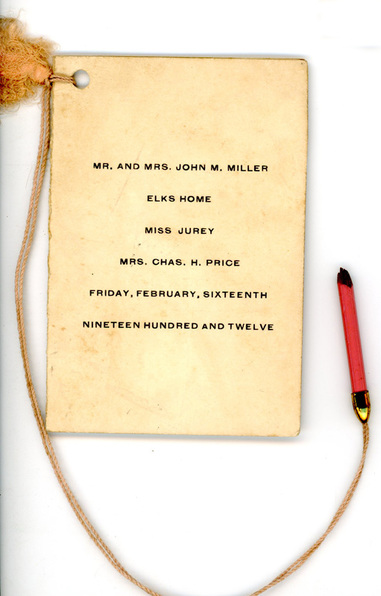 Dance card from a dance given in Marguerite Jurey's honor at the Elks Home in Mt. Sterling, Kentucky, two years prior to her marriage. Courtesy of Donna Russell.
Dance card from a dance given in Marguerite Jurey's honor at the Elks Home in Mt. Sterling, Kentucky, two years prior to her marriage. Courtesy of Donna Russell.
On May 20, 1914 Marguerite got married. The May 21 Courier-Journal had the story:
The wedding of Miss Marguerite May Jurey and Mr. Irl Emerson Carter Lucas, of Washington, will be solemnized the night of May 20 at 8:30 o'clock at the Presbyterian Church in Pewee Valley, the Rev. Peyton H. Hoge officiating.
A musical programme will be rendered by Mr. Charles R. Boynton, organist, assisted by Messrs. E Matthews and Clay Sutherland, of Paris, prior to the ceremony.
Mrs. John Miller, of Middlesboro, will be the matron of honor, and the bridesmaids will be Misses Rosella Thatcher, of Escanaba, Mich., and Elvira Johnston.
Mr. Sterline Baggett, of Birmingham, will be the best man and the groomsmen will be Messrs. Tray Turner, of Richmond, Va.; William Camp, of Washgton D.C.; George Elsele, George Boomer.
The little flower children will be Miss Elizabeth Weatherly and Master Paul Ingles, of Dante, Va.
The ceremony will be followed by a reception at the home of the bride's parents, Mr. and Mrs. William Nice Jury, at Pewee Valley.
The wedding of Miss Marguerite May Jurey and Mr. Irl Emerson Carter Lucas, of Washington, will be solemnized the night of May 20 at 8:30 o'clock at the Presbyterian Church in Pewee Valley, the Rev. Peyton H. Hoge officiating.
A musical programme will be rendered by Mr. Charles R. Boynton, organist, assisted by Messrs. E Matthews and Clay Sutherland, of Paris, prior to the ceremony.
Mrs. John Miller, of Middlesboro, will be the matron of honor, and the bridesmaids will be Misses Rosella Thatcher, of Escanaba, Mich., and Elvira Johnston.
Mr. Sterline Baggett, of Birmingham, will be the best man and the groomsmen will be Messrs. Tray Turner, of Richmond, Va.; William Camp, of Washgton D.C.; George Elsele, George Boomer.
The little flower children will be Miss Elizabeth Weatherly and Master Paul Ingles, of Dante, Va.
The ceremony will be followed by a reception at the home of the bride's parents, Mr. and Mrs. William Nice Jury, at Pewee Valley.
Death of William Jurey
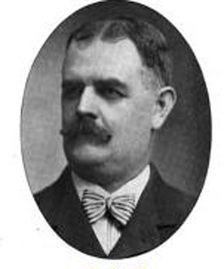 W.N. Jurey
W.N. Jurey
In 1916, William Jurey partnered with W.W. Harbourt. Harbourt was an agent for the L&N Railroad in south Oldham County. A March 1960 Oldham Era article on the razing of the old Pewee Valley train station provided this brief synopsis of his career:
W.W. Harbourt, Pewee Valley, retired L&N agent who worked at both the Crestwood and Pewee Valley stations, started at Pewee Valley about the time of World War 1 and learned telegraphy at that station and was manager for Western Union.
An Ode to Wilsey Harbourt, written by his neighor Allen Jackson, appeared in the April 1977 Call of the Pewee, and praised his skills as a telegraph operator:
W.W. Harbourt, Pewee Valley, retired L&N agent who worked at both the Crestwood and Pewee Valley stations, started at Pewee Valley about the time of World War 1 and learned telegraphy at that station and was manager for Western Union.
An Ode to Wilsey Harbourt, written by his neighor Allen Jackson, appeared in the April 1977 Call of the Pewee, and praised his skills as a telegraph operator:
Ode to Wilsie Harbourt
Our CW is a Bar and a Dot.
Now Morse, it's the spaces between 'em that makes 'em hot;
No way on Earth are the two the same ...
Yet they are both known by a common name.
To someone whose life is spent
Over his key, his way was bent.
He provided the Communication,
Helped build this mighty Nation,
Wrapped round this world
Two bands of Steel.
Worked long, long hours.
Never looked back.
They knew it was Willsie
At the other end of the Track.
He would stand there in the mud and rain
Holding up the orders for a fast, fast train.
He was part of steam and steel,
Loved to watch Those Driving Wheels
Spit 'n' sputter, steam valves that sigh.
Smell that hot water 'n' oil.
Huge Vibrating Thing
and a good crew could make her sing.
Hear her whistle, see her light,
Cross the prairie in a single night.
But she needed more Vision that she might see.
There was Willsie, with His Key.
Our CW is a Bar and a Dot.
Now Morse, it's the spaces between 'em that makes 'em hot;
No way on Earth are the two the same ...
Yet they are both known by a common name.
To someone whose life is spent
Over his key, his way was bent.
He provided the Communication,
Helped build this mighty Nation,
Wrapped round this world
Two bands of Steel.
Worked long, long hours.
Never looked back.
They knew it was Willsie
At the other end of the Track.
He would stand there in the mud and rain
Holding up the orders for a fast, fast train.
He was part of steam and steel,
Loved to watch Those Driving Wheels
Spit 'n' sputter, steam valves that sigh.
Smell that hot water 'n' oil.
Huge Vibrating Thing
and a good crew could make her sing.
Hear her whistle, see her light,
Cross the prairie in a single night.
But she needed more Vision that she might see.
There was Willsie, with His Key.
William Jurey died the following year at 3:30 p.m. on September 10. The September 17, 1917 Bourbon News in Paris, Ky., carried a report on his funeral:
----The funeral of Mr. W.N. Jurey, prominent business man of Pewee Valley, near Louisville, who died suddently in Louisville, Monday afternoon, was held at the Pewee Valley Presbyterian church in Pewee Valley at three o'clock. Burial followed in Louisville.
Mr. Jurey was for years an agent for the Louisville & Nashville railroad, and had been engaged in the coal business. He resided with his family in Louisville. Mr. Jurey is survived by his widow, who was formerly Miss Mamie Wilson, of near Paris, a sister of Messrs. J. Sims Wilson and D.S. Wilson, of Paris, and one daughter, Miss Margaret (sic) Jurey.
Mr. and Mrs. J. Sims Wilson attended the funeral.
Though the newspaper reported he was buried in Louisville, he was actually buried at the Jurey family plot in Pewee Valley Cemetery, where he rests with his son Albert, his wife Mary B., and their infant son who died at birth on June 30, 1890.
----The funeral of Mr. W.N. Jurey, prominent business man of Pewee Valley, near Louisville, who died suddently in Louisville, Monday afternoon, was held at the Pewee Valley Presbyterian church in Pewee Valley at three o'clock. Burial followed in Louisville.
Mr. Jurey was for years an agent for the Louisville & Nashville railroad, and had been engaged in the coal business. He resided with his family in Louisville. Mr. Jurey is survived by his widow, who was formerly Miss Mamie Wilson, of near Paris, a sister of Messrs. J. Sims Wilson and D.S. Wilson, of Paris, and one daughter, Miss Margaret (sic) Jurey.
Mr. and Mrs. J. Sims Wilson attended the funeral.
Though the newspaper reported he was buried in Louisville, he was actually buried at the Jurey family plot in Pewee Valley Cemetery, where he rests with his son Albert, his wife Mary B., and their infant son who died at birth on June 30, 1890.
The Jurey Family Plot at Pewee Valley Cemetery
Related Links

